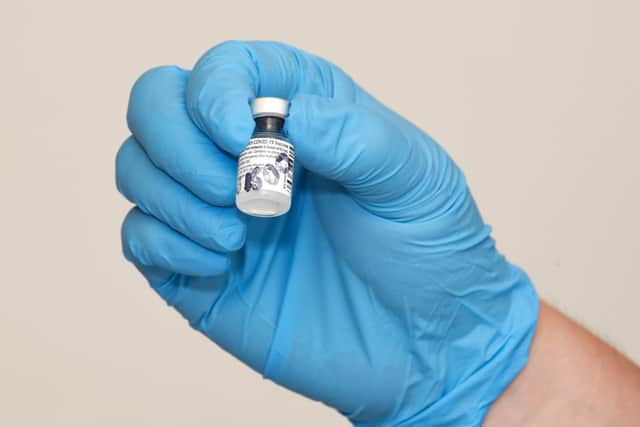Covid-19 vaccinations - Banbury's questions answered by a senior Oxford doctor; Part One


Dr Helen Salisbury, MA MBBS 1991 MRCP MRCGP, is a GP at Jericho Health Centre, Oxford and was one of the participants in the Oxford-AstraZenica vaccine trials.
She teaches on the the Communication Skills Course for medical students in Oxford and is a columnist on the British Medical Journal. She Tweets at @HelenRSalisbury.
Advertisement
Hide AdAdvertisement
Hide AdQ. The vaccines have been produced so quickly; how can we be sure they are absolutely safe in the longer term?


A. They have been produced quickly. Normally in a new vaccine development the company puts its proposal together then waits for ethics committees to meet, which might be months, then try and get funding together and these things take a long time.
This time, money was no object and everything could be done straight away because there was a big hurry. How do we know it doesn't cause a problem? It's only been about eight months since the first persons had both the Oxford Astrazenica vaccines. We would expect any problems with vaccines to show up pretty much straight away.The thing that happened so much quicker than we normally expect is getting to the stage of it being tried out in humans. I'm very confident we have the data we need. Lots and lots of people have had (the vaccines) now. And there have been a few side effects but not very many.
Q. The developers have skipped animal testing. Could it be hazardous to your heath a couple of years after having the vaccine?
Advertisement
Hide AdAdvertisement
Hide AdA. Certainly with the Oxford vaccine they did do animal testing. You can't say for definite (what will happen years after) because nobody had (the vaccine) two years ago. In the past, when vaccines have had side effects they've had them straight way and obviously we'll keep monitoring. Plausibly, it's difficult to see that they would get (a problem) very much later.


Q. What are the differences between the two vaccines and which one would you choose?
A. I would have whichever one I was offered. Because I think getting it sooner is more important than which one you get. What vaccines are doing is making sure there's a bit that looks like the virus and showing it to your immune system so your immune system will recognise it next time it comes and says 'aha, this is something we need to respond to'.
The Oxford AstraZeneca vaccine is more like old fashioned flu vaccines, which are a modified 'other' virus that is displaying some of the properties of this coronavirus.
Advertisement
Hide AdAdvertisement
Hide AdThe Pfizer one is an mRNA vaccine that uses a viral messenger - an instruction to create a little protein that would normally be on the virus so we create that little protein ourselves. It is not not creating the virus - it's just a little bit of protein, so your cells recognise this virus in the future.
It's new technology but it was being worked on for quite a long time before the pandemic for other viral illnesses (e.g. Ebola and Zika) and when the coronavirus came along they thought 'aha, we can use this technology'. They will all have been through the strict safety testing on animals and in humans and then you do efficacy testing in humans. So you test it to make sure it's safe then you test it to make sure it works, which are two slightly different things. Do you produce the antibodies? And do they definitely protect you from infection?
It's slightly complicated because we think that some of the immunity to coronavirus may be with other white cells in the body and not just antibodies. So you can't necessarily tell exactly how immune someone is.
Q. Which vaccine did you have?
A. I was in the vaccine trial for the Oxford AstraZeneca vaccine and I have now had the final (jab).
Q. Will they mix and match the vaccines?
Advertisement
Hide AdAdvertisement
Hide AdA. Originally, the Joint Council on Vaccines and Immunizations said if somebody had a vaccine, but it wasn't known which one, it was probably okay to give them a second one, even if it doesn't match the first one. There's now a suggestion that you might even get better protection with two different vaccines. But nobody is planning to do that at the moment.
Q. Does the vaccine actually get into a person's DNA?
A. The mRNA vaccine - Pfizer one - introduces a messenger which is an instruction to your cell to produce that protein. It is there only very, very briefly, enough time to produce the protein. If you say something's in someone's DNA it sounds like it's there permanently. This is very briefly and when the protein's there, it doesn't stay around for long either but long enough for you to recognise it in future and produce an antibody.
Q. It is true people can't choose the vaccine they have?
A. That is true at the moment because as GPs we've no idea which vaccine we're going to get from one week to the next. So, we are asked to work down our list in the order of priority. We usually know when we're inviting people which vaccine we'll have. At the moment we know for the next two weeks we're going to have the Oxford vaccine but we expect to have the Pfizer at some stage.
Q. What are the side effects of the vaccine?
A. The usual side effects are most people get a sore arm, for some a slight niggle and you may notice it when you're turning in bed for the first couple of nights. For some it actually looks a bit raised and red for a few days. That's really common and I think that's when either vaccine.
Advertisement
Hide AdAdvertisement
Hide AdWith the Pfizer vaccine , a few members of staff felt quite poorly for a few days, usually just a couple of days, but with a temperature and were feeling fluey. Our practice manager had to go to bed for most of the rest of the day because he felt so unwell with it. So some people do feel quite unwell for a couple of days but it does wear off quite quickly.
Q Have there been any serious side effects?
A. Not that we know of. There were a couple of people who had severe allergic reaction to the Pfizer vaccine and I think they've worked that out at a rate of about five per million (vaccinations given). I have not heard of any severe or life threatening reactions. There is a 'yellow card' system for doctors and patients who are encouraged to report any serious events after the vaccine. It is difficult to know whether things were caused by the vaccine but all of it is being written down and captured.
Q. Is there any chance there could be unforeseen problems down the road, for example for pregnant women or their babies?
A. At the moment, the vaccines are not licenced for pregnant women as far as I know. You can only get a licence to use something in pregnancy if it's been tested in pregnancy. Logically speaking it's very very difficult to see how this could cause any problems to pregnant women and we use lots of other vaccines in pregnancy. I have colleagues in the surgery who are pregnant who have opted to have the vaccine because they think it's safer to have the vaccine, than risk having an infection. But we can't know for sure.
Advertisement
Hide AdAdvertisement
Hide AdQ. What can we say to reassure a lot of people who say that they don't trust people 'at the top' and who believe the vaccine will just end up being more dangerous than the virus?
A. I think you probably need to separate the mishandling of this pandemic, particularly with the testing system which has been poor, and the failure to lock down and wasted money on PPE. But when it came to vaccine development they did not give the money to fly-by-night shysters that had no experience in this field. They gave it via the appropriate routes to the best people with massive track record in vaccine development.
Currently in this country, it is a vaccine group in in Oxford who have been working on vaccines for decades and decades and they're very well reputed. And I think the same happened in other in other places around the world. You've got BioNTech in Germany, working with Pfizer, and you've got the Moderna ones in America, so lots of vaccines are in development. But I'm very. I'm very confident that the appropriate amount of care and attention to detail has gone into the vaccines. I completely understand where the mistrust comes from but it shouldn't spread to the vaccine.
Q. One person asked, via Banburyshire Info, whether the vaccine was safe for a family member with a serious allergy to gelatine and rennet.
Advertisement
Hide AdAdvertisement
Hide AdA. Neither of them have any of these things in. There's a chemical called polyethylene glycol, which is in the Astrazenica one, which is the only thing really that is likely to cause an allergic reaction but it is very rare that people are allergic to it and they would probably know.
Q. Will we ever be offered the Sputnik (Russian) vaccine?
I don't know. There are about 60 vaccines in development. And I think if it turns out the Sputnik is better or covers other things which ours don't, I hope that we'll get global collaboration. It's not probably likely to happen anytime soon partly because we've got lots of other vaccines on the horizon and partly because of geopolitics being what they are. But I but I do think there is a lot of collaboration among scientists, even when governments don't collaborate as well. So if we do need to learn things from the Russians I hope we will.
Q. A reader asks about the research backing up postponing the second dose She had read the change from a couple of weeks to a couple of months (for the Pfizer vaccine), reduces effectiveness to about 35 per cent.
A. Oxford-AstraZeneca just published more data which shows a longer gap produces better immunity overall. I'm not worried about that one at all. With the Pfizer, I think the answer is we just don't know. Experience from other countries is quite encouraging that there doesn't seem to be much of a waning of vaccine response after the after three weeks. There was no trial data beyond that three week gap. So the people who made the vaccine said, 'we can't promise it will work then because we didn't test it like that'. The Joint Committee for Vaccines and Immunisations had to make a guess and say, if this vaccine works the same way that other vaccines do, we should be okay leaving it for a bit longer. And we can get more vaccines into more people and overall, that will reduce the number of people who die in this pandemic.
Advertisement
Hide AdAdvertisement
Hide AdAnd it's quite difficult to argue with that but I totally understand people's uncertainty. And there's another level of uncertainty in the vaccine trials. They did have people up to up to the age of 80 or slightly over (but probably not very many) when we know that oldest groups have a less strong immune response. So there's some argument saying for the very oldest group to keep the doses close together together. What we have heard from Israel, which has used a lot of the vaccine, is very encouraging in terms of reducing infection rates. But I think they did mostly have their doses fairly close together. They haven't gone for the whole 12 weeks so we're slightly out on the limb as a country with that.
Tomorrow we include questions about vaccines and the Black, Asian and Ethnic Minority community, whether Vitamin D should be given out, yearly boosters, new variants, vaccines for those who have had the virus, or who have asthma, or who have had cancer treatment - and many more.